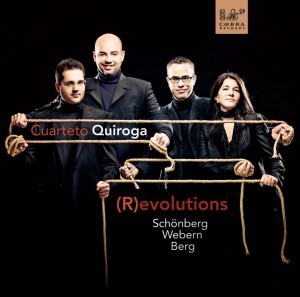 De nieuwe cd ‘(R)evolutions’ van het Spaanse strijkkwartet Cuarteto Quiroga is weliswaar al uitgekomen in 2013, maar pas begin dit jaar 2015 verkrijgbaar in Nederland. Het strijkkwartet speelt begin-werken van componisten uit de Tweede Weense School: Arnold Schönberg en zijn twee leerlingen Alban Berg en Anton Webern, uit de periode 1897 – 1916.
De nieuwe cd ‘(R)evolutions’ van het Spaanse strijkkwartet Cuarteto Quiroga is weliswaar al uitgekomen in 2013, maar pas begin dit jaar 2015 verkrijgbaar in Nederland. Het strijkkwartet speelt begin-werken van componisten uit de Tweede Weense School: Arnold Schönberg en zijn twee leerlingen Alban Berg en Anton Webern, uit de periode 1897 – 1916.
English version below
Het strijkkwartet Cuarteto Quiroga heeft gekozen voor een prachtig historisch chronologische volgorde op hun nieuwe album ‘(R)evolutions’. Het ‘Streichquartett in D-dur’ uit 1897 is het openingsstuk. Een werk dat stamt uit de periode waarin Schönberg nog tonaal schreef en aansluit bij Laat-Romantische componisten. Het thema uit het eerste deel ‘Allegro Molto‘ heeft, mede door zijn pentatoniek (5-toons-toonladder), zelfs een link naar de muziek uit de Nationale School van Dvorak. Naarmate het album vordert, wordt chromatiek in de composities belangrijker. Zoals in ‘Rondo für Streichquartett‘ uit 1906 van Anton Webern waarin tonaliteit langzaam bodem verliest en wordt vervangen door kleurschakeringen die helder naar binnen schijnen door een melodisch glas-in-lood raamwerk waarbij klanken langzaam meedraaien met de richting van de zon. Deze compositie-techniek wordt nog verder uitgebreid in ‘Sechs Bagatellen für Streichquartett Op. 9′ uit 1913 waarin Webern in zes korte composities de tonaliteit langzaam loslaat. In zes korte stukken wordt vanuit de stilte een sfeer gecreëerd die onmiskenbaar het hele toon- en klank-scale bestrijkt. Het album sluit af met een bewerking van J.S. Bach’s ‘Befiehl du deine Wege‘ uit de Matthäus Passion. Het Cuarteto Quiroga zit vol souplesse en is breed van timbre. Zowel het tonale werk van Schönberg als de a-tonale stukken van Webern en Berg schitteren naast het motet van J.S. Bach. Eensgezind, eenduidig en rijk van kleur bewijst dit strijkkwartet dat ‘(R)evolutions‘, zowel zonder als met ‘R‘, ruimschoots van toepassing is.
English version
The new CD ‘(R)evolutions‘ of the Spanish string quartet Cuarteto Quiroga was already released in 2013. In the Netherlands this album is available since the beginning of 2015. The string quartet plays initial work of composers of the Second Viennese School: Arnold Schoenberg and his two pupils Alban Berg and Anton Webern, from the period 1897 – 1916.
The string quartet Cuarteto Quiroga chose for a beautiful historic and in chronological order on their new album ‘(R)evolutions‘. The ‘String Quartet in D-dur’ from 1897 is the opening piece. Music from the period in which Schoenberg wrote tonally compositions, related to the Late Romantic style. The first part ‘Allegro Molto’ has, by it’s pentatonic (5tone-Scale) theme, even a link to the music of the National School of Dvorak. As the album continues, chromaticism gets more important in the compositions. As in ‘Rondo für Streichquartett‘ from 1906 by Anton Webern in which tonality slowly disappeares and will be replaced by a wonderful musical landscape of mystic harmonies. This composition technique is further explored in ‘Sechs Bagatelles für Streichquartett Op. 9‘ from 1913 in which Webern slowly leaves the tonality. In six short pieces he creates a great atmosphere that covers the whole tone and sound scale. The album closes with an arrangement of J.S. Bach’s ‘Befiehl du deine Wege’ from the St. Matthew Passion. The Cuarteto Quiroga is flexible quartet and wide in timbre. Both the tonal work of Schoenberg as a-tonal pieces by Webern and Berg shine next to J.S. Bach motet and shows the power of these four string instruments. In one musical voice this string quartet plays easily the ‘(R)evolutions’ – with or without the ‘R‘!
- Cuarteto Quiroga: ‘(R)evolutions’ (Cobra Records/New Arts International)
© Mattie Poels.

Geen reacties